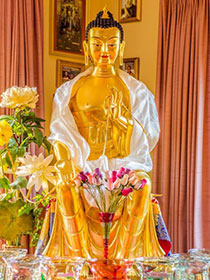- Home
- FPMT Homepage
Foundation for the Preservation of the Mahayana Tradition
The FPMT is an organization devoted to preserving and spreading Mahayana Buddhism worldwide by creating opportunities to listen, reflect, meditate, practice and actualize the unmistaken teachings of the Buddha and based on that experience spreading the Dharma to sentient beings. We provide integrated education through which people’s minds and hearts can be transformed into their highest potential for the benefit of others, inspired by an attitude of universal responsibility and service. We are committed to creating harmonious environments and helping all beings develop their full potential of infinite wisdom and compassion. Our organization is based on the Buddhist tradition of Lama Tsongkhapa of Tibet as taught to us by our founders Lama Thubten Yeshe and Lama Thubten Zopa Rinpoche.
- Willkommen
Die Stiftung zur Erhaltung der Mahayana Tradition (FPMT) ist eine Organisation, die sich weltweit für die Erhaltung und Verbreitung des Mahayana-Buddhismus einsetzt, indem sie Möglichkeiten schafft, den makellosen Lehren des Buddha zuzuhören, über sie zur reflektieren und zu meditieren und auf der Grundlage dieser Erfahrung das Dharma unter den Lebewesen zu verbreiten.
Wir bieten integrierte Schulungswege an, durch denen der Geist und das Herz der Menschen in ihr höchstes Potential verwandelt werden zum Wohl der anderen – inspiriert durch eine Haltung der universellen Verantwortung und dem Wunsch zu dienen. Wir haben uns verpflichtet, harmonische Umgebungen zu schaffen und allen Wesen zu helfen, ihr volles Potenzial unendlicher Weisheit und grenzenlosen Mitgefühls zu verwirklichen.
Unsere Organisation basiert auf der buddhistischen Tradition von Lama Tsongkhapa von Tibet, so wie sie uns von unseren Gründern Lama Thubten Yeshe und Lama Thubten Zopa Rinpoche gelehrt wird.
- Bienvenidos
La Fundación para la preservación de la tradición Mahayana (FPMT) es una organización que se dedica a preservar y difundir el budismo Mahayana en todo el mundo, creando oportunidades para escuchar, reflexionar, meditar, practicar y actualizar las enseñanzas inconfundibles de Buda y en base a esa experiencia difundir el Dharma a los seres.
Proporcionamos una educación integrada a través de la cual las mentes y los corazones de las personas se pueden transformar en su mayor potencial para el beneficio de los demás, inspirados por una actitud de responsabilidad y servicio universales. Estamos comprometidos a crear ambientes armoniosos y ayudar a todos los seres a desarrollar todo su potencial de infinita sabiduría y compasión.
Nuestra organización se basa en la tradición budista de Lama Tsongkhapa del Tíbet como nos lo enseñaron nuestros fundadores Lama Thubten Yeshe y Lama Zopa Rinpoche.
A continuación puede ver una lista de los centros y sus páginas web en su lengua preferida.
- Bienvenue
L’organisation de la FPMT a pour vocation la préservation et la diffusion du bouddhisme du mahayana dans le monde entier. Elle offre l’opportunité d’écouter, de réfléchir, de méditer, de pratiquer et de réaliser les enseignements excellents du Bouddha, pour ensuite transmettre le Dharma à tous les êtres. Nous proposons une formation intégrée grâce à laquelle le cœur et l’esprit de chacun peuvent accomplir leur potentiel le plus élevé pour le bien d’autrui, inspirés par le sens du service et une responsabilité universelle. Nous nous engageons à créer un environnement harmonieux et à aider tous les êtres à épanouir leur potentiel illimité de compassion et de sagesse. Notre organisation s’appuie sur la tradition guéloukpa de Lama Tsongkhapa du Tibet, telle qu’elle a été enseignée par nos fondateurs Lama Thoubtèn Yéshé et Lama Zopa Rinpoché.
Visitez le site de notre Editions Mahayana pour les traductions, conseils et nouvelles du Bureau international en français.
Voici une liste de centres et de leurs sites dans votre langue préférée
- Benvenuto
L’FPMT è un organizzazione il cui scopo è preservare e diffondere il Buddhismo Mahayana nel mondo, creando occasioni di ascolto, riflessione, meditazione e pratica dei perfetti insegnamenti del Buddha, al fine di attualizzare e diffondere il Dharma fra tutti gli esseri senzienti.
Offriamo un’educazione integrata, che può trasformare la mente e i cuori delle persone nel loro massimo potenziale, per il beneficio di tutti gli esseri, ispirati da un’attitudine di responsabilità universale e di servizio.
Il nostro obiettivo è quello di creare contesti armoniosi e aiutare tutti gli esseri a sviluppare in modo completo le proprie potenzialità di infinita saggezza e compassione.
La nostra organizzazione si basa sulla tradizione buddhista di Lama Tsongkhapa del Tibet, così come ci è stata insegnata dai nostri fondatori Lama Thubten Yeshe e Lama Zopa Rinpoche.
Di seguito potete trovare un elenco dei centri e dei loro siti nella lingua da voi prescelta.
- 欢迎 / 歡迎
简体中文
“护持大乘法脉基金会”( 英文简称:FPMT。全名:Foundation for the Preservation of the Mahayana Tradition) 是一个致力于护持和弘扬大乘佛法的国际佛教组织。我们提供听闻,思维,禅修,修行和实证佛陀无误教法的机会,以便让一切众生都能够享受佛法的指引和滋润。
我们全力创造和谐融洽的环境, 为人们提供解行并重的完整佛法教育,以便启发内在的环宇悲心及责任心,并开发内心所蕴藏的巨大潜能 — 无限的智慧与悲心 — 以便利益和服务一切有情。
FPMT的创办人是图腾耶喜喇嘛和喇嘛梭巴仁波切。我们所修习的是由两位上师所教导的,西藏喀巴大师的佛法传承。
繁體中文
護持大乘法脈基金會”( 英文簡稱:FPMT。全名:Found
ation for the Preservation of the Mahayana Tradition ) 是一個致力於護持和弘揚大乘佛法的國際佛教組織。我們提供聽聞, 思維,禪修,修行和實證佛陀無誤教法的機會,以便讓一切眾生都能 夠享受佛法的指引和滋潤。 我們全力創造和諧融洽的環境,
為人們提供解行並重的完整佛法教育,以便啟發內在的環宇悲心及責 任心,並開發內心所蘊藏的巨大潛能 — 無限的智慧與悲心 – – 以便利益和服務一切有情。 FPMT的創辦人是圖騰耶喜喇嘛和喇嘛梭巴仁波切。
我們所修習的是由兩位上師所教導的,西藏喀巴大師的佛法傳承。 察看道场信息:
- FPMT Homepage
- News/Media
-
- Study & Practice
-
-
- About FPMT Education Services
- Latest News
- Programs
- New to Buddhism?
- Buddhist Mind Science: Activating Your Potential
- Heart Advice for Death and Dying
- Discovering Buddhism
- Living in the Path
- Exploring Buddhism
- FPMT Basic Program
- FPMT Masters Program
- FPMT In-Depth Meditation Training
- Maitripa College
- Lotsawa Rinchen Zangpo Translator Program
- Universal Education for Compassion & Wisdom
- Online Learning Center
-
- Prayers & Practice Materials
- Overview of Prayers & Practices
- Full Catalogue of Prayers & Practice Materials
- Explore Popular Topics
- Benefiting Animals
- Chenrezig Resources
- Death & Dying Resources
- Lama Chopa (Guru Puja)
- Lama Zopa Rinpoche: Compendium of Precious Instructions
- Lama Zopa Rinpoche: Life Practice Advice
- Lama Zopa Rinpoche Practice Series
- Lamrim Resources
- Mantras
- Prayer Book Updates
- Purification Practices
- Sutras
- Thought Transformation (Lojong)
- Audio Materials
- Dharma Dates - Tibetan Calendar
- Translation Services
- Publishing Services
- Ways to Offer Support
- Prayers & Practice Materials
-
- Teachings and Advice
- Find Teachings and Advice
- Lama Zopa Rinpoche Advice Page
- Lama Zopa Rinpoche: Compendium of Precious Instructions
- Lama Zopa Rinpoche Video Teachings
- ༧སྐྱབས་རྗེ་བཟོད་པ་རིན་པོ་ཆེ་མཆོག་ནས་སྩལ་བའི་བཀའ་སློབ་བརྙན་འཕྲིན།
- Podcasts
- Lama Yeshe Wisdom Archive
- Buddhism FAQ
- Dharma for Young People
- Resources on Holy Objects
- Teachings and Advice
-
-
*If a menu item has a submenu clicking once will expand the menu clicking twice will open the page.
-
-
- Centers
-
- Teachers
-
- Projects
-
-
-
-
*If a menu item has a submenu clicking once will expand the menu clicking twice will open the page.
-
-
- FPMT
-
- Shop
-
-
-
The Foundation Store is FPMT’s online shop and features a vast selection of Buddhist study and practice materials written or recommended by our lineage gurus. These items include homestudy programs, prayers and practices in PDF or eBook format, materials for children, and other resources to support practitioners.
Items displayed in the shop are made available for Dharma practice and educational purposes, and never for the purpose of profiting from their sale. Please read FPMT Foundation Store Policy Regarding Dharma Items for more information.
-
-
16
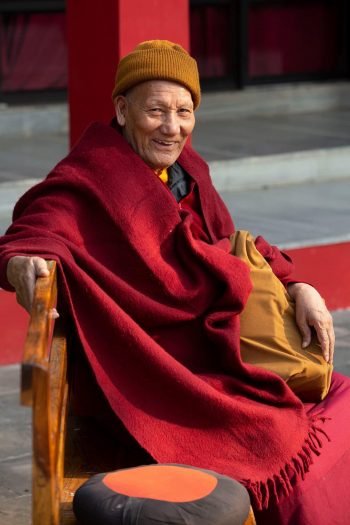
Ladakhi Lama at Root Institute for Wisdom Culture, Bodhgaya, Gaya District, Bihar, India. Photo by Paolo Regis (@paoloregisphotography).
We are saddened to share the news that Ven. Thupten Tsewang (also known as Ladakhi Lama and Baling Lama), born in Ladakh, India, passed away at the age of 92, at Kalpataru Buddha Vihar, Nagpur, Maharashtra, India, on April 25, 2021, of natural causes.
Ladakhi Lama had been an attendant to Indian Buddhist master Khunu Lama Tenzin Gyaltsen Rinpoche (1894–1977). In his later years he was a part-time resident at Root Institute for Wisdom Culture in Bodhgaya, Gaya District, Bihar, India.
Geshe Ngawang Rabga, the FPMT resident geshe at Root Institute from 2016–2020, wrote a kind remembrance of Gen-la, as Ladakhi Lama was sometimes called, to share with the international FPMT community:
“Gen-la was very respectable and close to me. His demise has saddened me deeply. He lived his life as a fully ordained monk and received Dharma teachings from many great masters like His Holiness the Dalai Lama and Kyabje Zopa Rinpoche. Therefore, he made his life a meaningful one. I truly appreciate the life he lived. I pray from my heart that he returns in his next life as a great teacher of the Buddhadharma in general, and especially of the teachings of Lama Tsongkhapa.”
In his younger days, before he ordained, Ladakhi Lama worked as a radio broadcaster at All India Radio in Ladakh. Ven. Tenzin Paldron, center director at Root Institute from 2015–2019, and Annie McGhee, who volunteered at the center, remembered him as an avid reader of The Times of India. “Lama loved to read the newspaper on a daily basis and was very well versed in political affairs in India and loved to discuss politics with the guests that visited,” Ven. Paldron said. Annie added, “He loved a good debate and engaged in many animated discussions over meals at the dining table.”
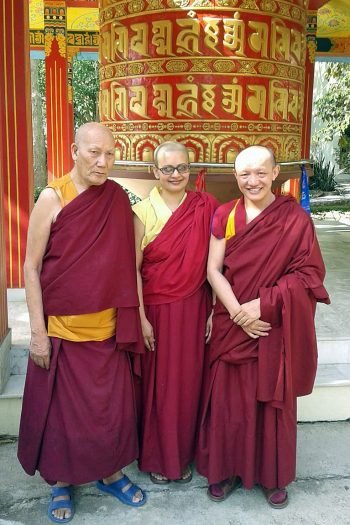
Ladakhi Lama, Ven. Tenzin Paldron, and Geshe Ngawang Rabga at Root Institute for Wisdom Culture, Bodhgaya, Gaya District, Bihar, India. Photo courtesy of Root Institute.
Ladakhi Lama met Khunu Lama in Varanasi in 1954, and Khunu Lama ordained him shortly after their meeting. After six years of being a devoted disciple, he became Khunu Lama’s attendant in 1960. Ven. Paldron said, “He often regaled many of us in the dining hall with stories of the times he spent serving high lamas like Khunu Lama and Denma Locho Rinpoche, and of the rich and varied experiences that he had living as an ordained monk in various temples.”
Annie recalled, “One story which really moved me was when Ladakhi Lama was making lunch—probably rice and dhal—and Khunu Lama told him, ‘Stop cooking now; we have to practice.’ So they had half-cooked rice for lunch! If only we had that dedication and commitment to study and practice the Dharma in the most beneficial way and not waste time on trivialities like food.”
Ladakhi Lama lived in various places, such as Mumbai and Nagpur, before going to Bodhgaya, which is where he met Lama Zopa Rinpoche. Rinpoche requested that Ladakhi Lama stay at Root Institute. “When I became director of Root Institute in June 2015, the first task given to me by Rinpoche was, ‘Take good care of Ladakhi Lama,’” Ven. Paldron said.
He became a much valued presence at Root Institute. “He was like a fatherly figure to us in many ways, often giving us teachings and advice, including making predictions such as who would get ordained,” Ven. Paldron said.
Vicki Taylor, another volunteer at the center, said, “Gen-la was a quiet and friendly presence for several years, bringing humor and cheer to our guests—especially in the dining hall. Despite his advanced age, Gen-la retained the fresh perspective and cheeky sweetness of a child, and I’m sure this gentle presence radiating Dharma contentment benefited many people.”
Indian monk Ven. Tashi Choedup first met Ladakhi Lama at Root Institute in 2017 and had many fond memories of him to share:
“Newly ordained myself, I hadn’t met many Indian ordained Sangha, Himalayan or otherwise; Lama was one of the first. His welcoming nature, warmth, love, and our ability to communicate in Hindi helped us establish a connection from our very first meeting. Lama was generous, sharing stories from his life experiences during our mealtimes. No matter how brief a guest’s visit to Root Institute was, all were touched by Lama’s infectious smile and kindness.
“Lama took me to my first ever Sangha dana ceremony and to many more such gatherings in Bodhgaya thereafter. I fondly remember making a trip to Patna Museum with Lama to pay respects to Buddha relics there.
“I also had the fortune of living in the room next to Lama’s and had the blessing of waking up to Lama’s prayers as early as 3 A.M. every morning. Although we only knew each other for a few years, Lama inspired me to practice Dharma more diligently and gave me the confidence to live an ordained life until the very end.
“Of Lama’s many qualities, one that was always visible was his giving nature. He was always giving away whatever money, food, or resources he had with him. He would never keep anything for himself—except maybe for the packets of Yippee instant noodles, his favorite.”
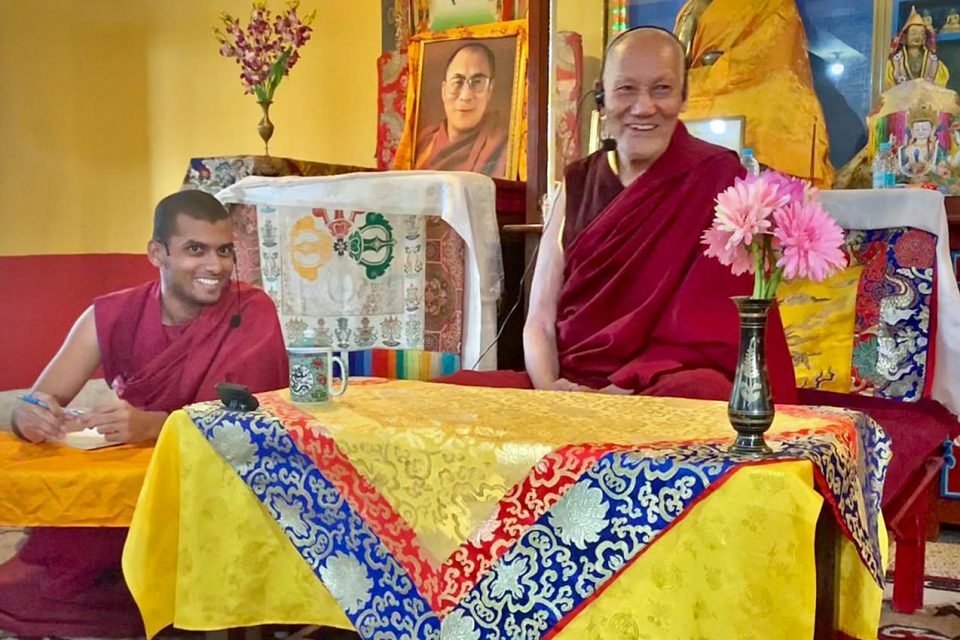
Ven. Tashi Choedup and Ladakhi Lama at Root Institute for Wisdom Culture, Bodhgaya, Gaya District, Bihar, India, November 2019. Photo by Ven. Thubten Munsel.
Inder Kant, who met Ladakhi Lama in 2016 in Bodhgaya, commented on his kindness and humor as well as his profound generosity, recalling a story about visiting a very sick 102-year-old lama at a Tibetan monastery in Bodhgaya with Ladakhi Lama. “We gave the lama some food we had brought for him,” Inder said. “Ladakhi Lama used to visit the elderly lama, looking after him. The lama’s room was messy so Ladakhi Lama and I cleaned the room and made his bed with a new bed sheet. It was overwhelming to see the kindness of Ladakhi Lama.”
Ven. Paldron recounted another quality of Ladakhi Lama: “He was not afraid to challenge someone’s authority, no matter what their position was, if Lama thought they were behaving unethically or inappropriately. He shared various stories of how he had confronted bullies—including some lamas in temples—to make sure that the vulnerable and needy were treated fairly and justly. Lama did not care about his reputation or what would happen to him. If something needed to be corrected, he spoke out against it very fiercely.”
Ladakhi Lama was also very knowledgeable about the history of Bodhgaya and the Mahabodhi Stupa, as well as the significance of many of the small and large stupas around the main temple. He also knew all the main pilgrimage sites.
“In early October 2016, I arrived at Root Institute to volunteer for the winter season,” Annie McGhee said. “I had longed to go to Vikramashila, the home monastery of Lama Atisha. This pilgrimage site is in northeastern Bihar, a region unsafe to travel to as a single woman. I had made many prayers to go and had mentioned this to two friends. One morning I was standing in the breakfast queue when Ladakhi Lama came up to me and said, ‘You want to go to Vikramashila? OK, I will take you.’ I was overjoyed but a little concerned for Lama because it would be a long journey with rough conditions.
“A few of us from Root Institute made the trip together, traveling for ten hours one way by Jeep. At the entrance we stopped to take it all in, as it was a large and important monastic university in its time. Lama remarked, ‘Here is what is left of stupas that would have held the 108 arhats who resided at Vikramashila.’ He was quiet and reflective at other places but led us in many practices and prayers at some of the holy sites.”
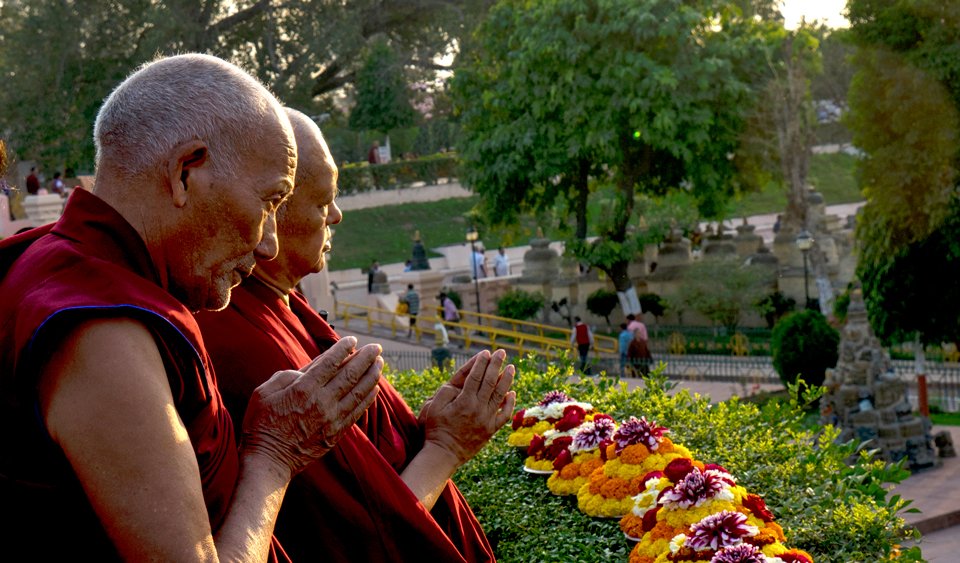
Ladakhi Lama and Lama Zopa Rinpoche at the Mahabodhi Stupa, Bodhgaya, Gaya District, Bihar, India, 2015. Photo by Andy Melnic.
Sharing her favorite memory of Ladakhi Lama, Vicki Taylor said, “Lama Zopa Rinpoche had requested from Gen-la the oral transmission of Gampopa’s classic lamrim text The Jewel Ornament of Liberation, which he himself had received from Khunu Lama. The transmission took more than one session, and a few of us were gathered in the Root Institute’s small gompa, about to start a subsequent session. When Rinpoche arrived, he showed great respect to Gen-la by trying to prostrate to him before we resumed. Gen-la could not bear to see Rinpoche struggle to prostrate to him, due to Rinpoche’s manifesting signs of a stroke and especially because of Gen-la’s deep respect and appreciation for Rinpoche. So Rinpoche was trying to prostrate, and Gen-la was trying to hold one of his arms to prevent him, all the while politely imploring Rinpoche not to prostrate. I remember the two of them, in a sort of ‘battle of politeness,’ intent on showing great respect to each other. It was beautiful to see.”
The practice of bodhicitta was very close to Ladakhi Lama’s heart. At Root Institute, he also gave the transmission of the verses from Jewel Lamp: A Praise of Bodhicitta, written by Khunu Lama.
Because it was his wish to go to Tushita Pure Land once he departed his body, a butter lamp is being offered in honor of Ladakhi Lama at Tushita Meditation Center, the FPMT center in Dharamsala, India, over the forty-nine day period along with daily prayers and dedications. May all of Lama’s wishes be fulfilled and may he quickly return to guide us on the path to attain enlightenment for the benefit of all sentient beings.
For more on practices recommended by Lama Zopa Rinpoche at time of death and other resources to support yourself and loved ones at time of death, please visit fpmt.org/death/.
FPMT.org and Mandala Publications brings you news of Lama Zopa Rinpoche and of activities, teachings, and events from over 160 FPMT centers, projects, and services around the globe. If you like what you read, consider becoming a Friend of FPMT, which supports our work.
- Home
- News/Media
- Study & Practice
- About FPMT Education Services
- Latest News
- Programs
- New to Buddhism?
- Buddhist Mind Science: Activating Your Potential
- Heart Advice for Death and Dying
- Discovering Buddhism
- Living in the Path
- Exploring Buddhism
- FPMT Basic Program
- FPMT Masters Program
- FPMT In-Depth Meditation Training
- Maitripa College
- Lotsawa Rinchen Zangpo Translator Program
- Universal Education for Compassion & Wisdom
- Online Learning Center
- Prayers & Practice Materials
- Overview of Prayers & Practices
- Full Catalogue of Prayers & Practice Materials
- Explore Popular Topics
- Benefiting Animals
- Chenrezig Resources
- Death & Dying Resources
- Lama Chopa (Guru Puja)
- Lama Zopa Rinpoche: Compendium of Precious Instructions
- Lama Zopa Rinpoche: Life Practice Advice
- Lama Zopa Rinpoche Practice Series
- Lamrim Resources
- Mantras
- Prayer Book Updates
- Purification Practices
- Sutras
- Thought Transformation (Lojong)
- Audio Materials
- Dharma Dates – Tibetan Calendar
- Translation Services
- Publishing Services
- Teachings and Advice
- Find Teachings and Advice
- Lama Zopa Rinpoche Advice Page
- Lama Zopa Rinpoche: Compendium of Precious Instructions
- Lama Zopa Rinpoche Video Teachings
- ༧སྐྱབས་རྗེ་བཟོད་པ་རིན་པོ་ཆེ་མཆོག་ནས་སྩལ་བའི་བཀའ་སློབ་བརྙན་འཕྲིན།
- Podcasts
- Lama Yeshe Wisdom Archive
- Buddhism FAQ
- Dharma for Young People
- Resources on Holy Objects
- Ways to Offer Support
- Centers
- Affiliates Area
- Teachers
- Projects
- Charitable Projects
- Make a Donation
- Applying for Grants
- News about Projects
- Other Projects within FPMT
- Support International Office
- Projects Photo Galleries
- Give Where Most Needed
- FPMT
- Shop
Translate*
*powered by Google TranslateTranslation of pages on fpmt.org is performed by Google Translate, a third party service which FPMT has no control over. The service provides automated computer translations that are only an approximation of the websites' original content. The translations should not be considered exact and only used as a rough guide.Once you realize the true evolution of your mental problems, you’ll never blame any other living being for how you feel.







